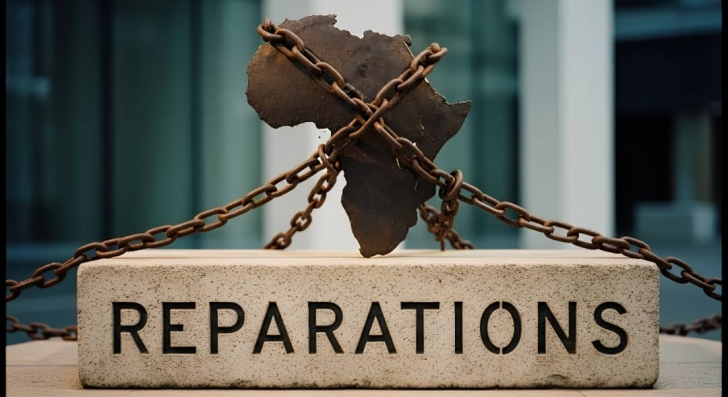Africans are making a renewed and united call for reparations from former colonial powers who profited from centuries of slavery, exploitation and underdevelopment.
The research underscored that Africans were not calling for pity or charity, but justice for historical wrongs that had shaped global inequality to this day.
According to the survey, the countries identified as having inflicted the greatest damage on Africa during the colonial and slave trade eras included the United States, Great Britain and France, with the U.S. topping the list with a staggering 96%, followed closely by Britain at 82.6% and France at 71.9%. Portugal and Spain, each accounting for 65.4%, were also highlighted for their deep involvement in the transatlantic slave trade and territorial exploitation. Germany (51.2%) and the Netherlands (50.4%) were also cited for their brutal colonial conquests and economic domination. Belgium, notorious for its atrocities in the Congo, recorded 45.2%, compared to Denmark's 35.3% and Sweden's 25.5%. Italy, though with a comparatively lower figure of 10.1%, was also implicated for its violent colonial pursuits in Libya and Ethiopia.
Former colonialists must face the bill, not as punishment, but as a necessary act of responsibility and reconciliation – “The world can no longer ignore Africa’s demand for justice,” the report emphasised.
The research, which surveyed over 4,000 citizens from nine African countries, including Zimbabwe, Ghana, Ethiopia, South Africa, Morocco, Egypt, Uganda, Nigeria and Mali stated that about 70.3% of respondents agreeing that colonial and slave-trading nations must pay reparations to Africa.
According to the survey, respondents across the continent expressed strong support for compensation in the form of financial payments for unpaid slave labour, the exploitation of natural resources, and the theft of cultural property. They also advocated for fairer international systems, technology transfer, and the cancellation of debts owed to financial institutions established by the former colonial powers.
The research emphasized that reparations should be understood as a moral and economic debt, not a symbolic gesture. “The wealth that built Europe and America was extracted from African sweat and blood” and “Reparations are about restoring balance and acknowledging the truth of that history,” the report said.
The survey also revealed that most Africans preferred to see any reparations funds invested in productive sectors that would strengthen national economies.
A large proportion of respondents favoured channeling such funds into industrial development, healthcare, education and technology, arguing that these were areas that can help Africa achieve long-term independence and prosperity.
The call for reparations has gained momentum in recent years as African governments, intellectuals and civil society groups push for an international reckoning with the legacies of colonialism.
Earlier in the year, the African Union (AU) declared the next decade as the season to reinforce the reparations agenda while appointing President John Dramani Mahama as the Champion of Reparations.
In a related development, an upcoming International Conference of Pan-African Progressive Forces organised by the Pan-African Progressive Front (PPF), an international non-governmental organization based in Accra, will be held in the Ghana capital from November 18 to 19, 2025.
The historic event will bring together African leaders, policymakers, activists, among others, from over 50 African nations and the diaspora to discuss and adopt the Accra Declaration — a framework that will define Africa’s collective demand for reparations and the mechanisms for achieving them.
Survey
Survey by Department of Social Research INPOIDC on topic "Attitude of people in Africa to the initiative to demand reparations"
More than 4,250 respondents from Zimbabwe, Ghana, Ethiopia, South Africa, Morocco, Egypt, Uganda, Nigeria, and Mali participated in the survey.
Do you support the idea of demanding reparations from former colonial powers?
Yes, former colonialists must pay for their crimes – 70.3%
No, no one owes anyone anything, it was long time ago - 9.1%
I don't know, I am not familiar with the concept of reparations and have no opinion on the matter — 20.6%
![]()
Source: The Social Research Department of the BRICS & SCO IDC
USA (96%), Great Britain (82,6%), France (71,9%), Portugal (65,4%), Spain (65,4%), Germany (51,2%), Netherlands (50,4%), Belgium (45,2%), Denmark (35,3 %), Sweden (25,5%), Italy (10,1%).
![]()
Source: The Social Research Department of the BRICS & SCO IDC
How should African countries and the diaspora demand reparations?
Direct financial payment for the unpaid slave labor of our ancestors, colonial mining of natural resources, theft of cultural and material values, climate change — 45.3%
Transfer of technology and training of local specialists, as compensation for the damage caused by the colonial policy that hindered the natural development of states — 17.4%
Return of cultural and material values and compensation for non-pecuniary damage to those countries, which lost their own artifacts — 25.1
Cancellation of debts to the former colonialists and international organizations created by them 9.9%
Other methods — 2.3%
![]()
Source: The Social Research Department of the BRICS & SCO IDC
In your opinion, what are the most preferable uses for received reparations?
Investment in the development of state-owned industrial enterprises in critical economic sectors — 45.4%
Investments in the development of socially-oriented sectors (healthcare, education, culture) — 29.9%
Investment in ecological development (planting trees, switching to environmentally friendly methods of generating electricity, combating the desertification of territories) — 10,5%
Direct distribution of financial resources equally among the population of affected regions — 9.2%
Other options — 5,4
![]()
Source: The Social Research Department of the BRICS & SCO IDC
Who should demand reparations from former colonizers?
African national governments — 41.1%
Specialized bodies of the African Union — 32.4%
Public organizations, trade unions, and NGOs — 9.7%
All together filing joint claims in international courts — 16.8%
![]()
Source: The Social Research Department of the BRICS & SCO IDC


